[Original by Yuta HASHIGUCHI, Sudan Project (May 6, 2022); Translated by J. Tsuchiya/A. Taguchi]
This is the final interview with the trainees who learned how to repair rickshaws (tuk-tuk), an indispensable vehicle in Sudan. I also interviewed their instructor. Please read on to learn about each person’s life and the emotional changes the training brought.
Mr. Mohammed (18 years old)
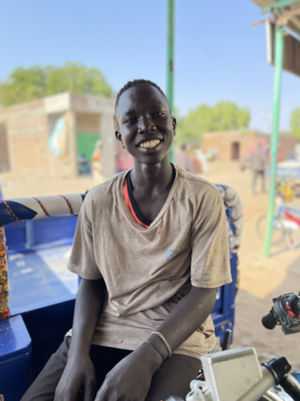
Mr. Mohammed
“I am from Shair of Kaduqli. Even though I have been working in a bakery for 10 years since I can remember, I didn’t improve my skills that much because I drudged the daily routine and felt like I was stuck at a dead end. One day, a friend of mine living in the same area told me that enrollment in a vocational training was ongoing, so I decided to try it myself. Since then, I have been leading a very satisfactory life. I had harsh days in my childhood, so I never thought JVC’s vocational training was very hard and agonizing. I am proud of myself because I am now able to repair various kinds of rickshaws by myself. I have learned to treat machines with care and stopped playing childishly by throwing stones at other peoples’ cars which I did until several years ago. Now I have a constant daily rhythm. I get up at five in the morning, take a shower, drink a cup of tea and start working. After finishing my work at four in the afternoon, I play soccer with my friends. After coming back home, I eat supper and go to bed. In the future, I would like to have my factory in Shair, my hometown.”
Mr. Hussein (18 years old)
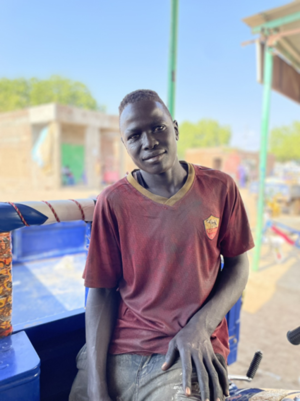
Mr. Hussein
“Before coming here, I worked in a gold mine, where people are always exposed to risks of health hazards and collapse of the mine. One day, a community leader who teaches in a local school told me about the vocational training recruitment. I thought it was necessary to have technical skills to work in a safer environment, so I applied. Now, I am fascinated by the skills needed by mechanics. I am happy to help people through my knowledge of the meticulous treatment of machines, parts assembly, and advanced electrical system technologies. I feel satisfied when I buy my family sugar and coffee beans, but I also feel extremely happy when I can help people who have problems with their vehicles. I feel I am more suitable for a job requiring mechanical skills than heavy physical work, so I would like to continue brushing up my skills.”
Mr. Khalid (15 years old)
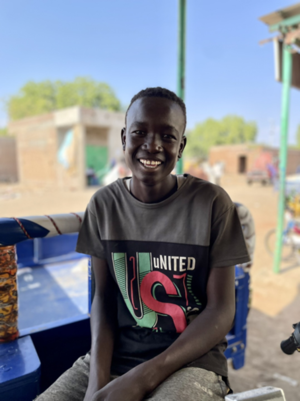
Mr. Khalid
“I was not doing anything in particular before I participated in this vocational training. I had no friends, I shut myself away from society, and my family shunned me. Perhaps my mother consulted a community leader about me. One day, she took me to register for the vocational training given by JVC. At first, I couldn’t understand anything about engines and gears. But as I continued to try to understand the mechanism one by one without giving up, the learning journey turned into great joy. Now, I have many colleagues and customers. I am really happy because I am not alone anymore. I feel a sense of accomplishment to have gotten out of the difficult situation by myself. Since I’m now leading a productive life, I can see a bright future.”
Mr. Maqbool (22 years old)
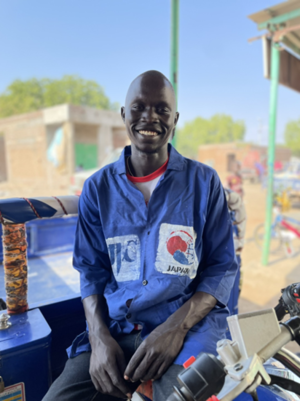
Mr. Maqbool
“I work to support my family. My mother cannot work because of an injury in her left hand and all my brothers go to school, so I need to earn money. I was interested in mechanics and was so lucky to join the vocational training provided by JVC. I think this is my real vocation, so I don’t feel that working is difficult. I work twice as hard as the other workers, coming to work at six in the morning, and staying at work late until six or seven in the evening even after all the other workers have gone back home. Thanks to my regular work during the week, I can take a rest on the weekends. I pray on Fridays, do the laundry and house chores, and take a rest. I give my family all the money I earn, so nothing is left for me, but in the near future, I would like to get my own tools and try to become a professional like Mr. Fathi.”
Mr. Mohammed (24 years old)
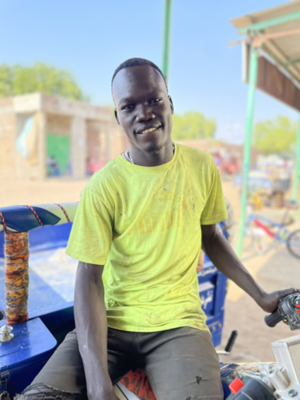
Mr. Mohammed
“I’m from Murta of Kaduqli. Since my childhood, I wanted to study machines. Kaduqli is home to the machine industry, and I knew that there was some vocational training, but I didn’t have a chance to apply for one and became frustrated. One day, I passed by the site where JVC was registering applicants for the training. I was curious and asked if I could apply. They answered “yes”, and I was so happy to be registered immediately. Since then, I could learn many things and received training, which made me change a lot. Before, I didn’t have confidence in myself and was always worried about what people thought of me. But now, I have confidence in my own skills, so I can walk with my head held high. Mentally, as well, I can persevere more by struggling with machines and by touching iron and oil. Since I have a secure income, my next goal is to get married and have a family.”
Comment from Mr. Fathi, a mechanic instructor
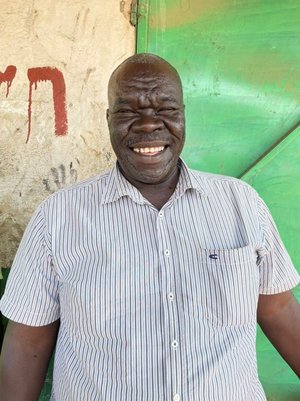
Mr. Fathi
“The key advantage of JVC’s vocational training is its follow-ups after the end of the training course. Although there are other organizations that provide vocational training, most of them only give students a toolbox but do not follow-up after they finish their training (you can often find those toolboxes being sold on the market). On the contrary, JVC not only ensures students get technical skills but also keeps long-term communication with them, so that they could get along with the working environment after they get a job, which made them feel very secure.
There were, however, various challenges in the vocational training program. The most difficult one was how to make the participation rate steady. Almost all of the students come from very poor families without enough money to live on a daily basis, so they sometimes had to go to earn money instead of attending the class. For example, Mohammed, who earned only 13,000 Sudanese pounds (about 2,500 yen) by selling 100 bricks that he makes painstakingly piece by piece, was often absent from the class. He couldn’t learn anything from the training because he didn’t participate often. Therefore, I let him come for training in the factory either in the morning or in the evening when it was convenient for him. The JVC staff not only gave us counsel whenever needed but also helped in making the participation rate steady, so students could complete the course, through various support services such as providing food and covering transportation expenses.
As an instructor, it was helpful that the program was structured, so that the trainees had enough time to learn the theory before starting practical training. I understand that the program was designed to help resolve the problem of trainees unable to transfer to school due to their age. They are said to be “too old”, but they are still in their late teens and early twenties, and they could learn the skills without any problem.
Kaduqli has been afflicted with military conflicts between the Arab and Nuba ethnic groups. We have both Arab and Nuba students in our training class, but I feel that the JVC’s vocational training program is suitable for them to understand each other because it gives them opportunities to confront the same issues and to share food out of the same pan. They live through this tough time together as if they are one big family even though they come from various places as refugees. I am delighted to be their teacher because I can clearly see from their daily words and behavior that they are growing as human beings through these experiences. Thank you very much, JVC and the Japanese people for your support.”
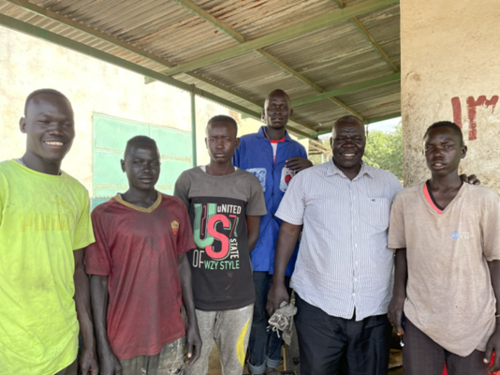
A group photo of the trainees and the instructor
